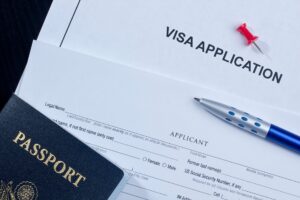Obtaining a waiver after a criminal conviction is often one of the best ways to be able to legally enter the United States. The U.S. has certain grounds of inadmissibility that prohibits certain individuals from being able to immigrate, one of those grounds being criminal convictions. However, there are ways around this with the right waivers as long, as you are able to meet the eligibility requirements. Keep reading to find out how you can obtain a waiver after a criminal conviction as a way of achieving the ability to legally immigrate.
What Are the Grounds of Inadmissibility?
Before we discussed criminal inadmissibility immigration relief options, it is important to understand what the grounds of inadmissibility actually are. These are grounds that the United States has established to determine who is ineligible to enter the country. The grounds of inadmissibility are there to protect the American public from things like criminal, health, and security risks.
Here are the grounds of inadmissibility you will have to adhere to if you wish to immigrate to the U.S.:
- Medical grounds: Health-related grounds of inadmissibility include individuals with communicable diseases, a lack of required vaccinations, physical or mental disorders that could be harmful to others, and drug abusers or addicts.
- Criminal grounds: These grounds include crimes of moral turpitude, controlled substance traffic occurs, human traffickers, money launderers, those who engage in prostitution, and those with two or more criminal convictions with five years or more of imprisonment.
- Security grounds: Certain grounds are in place to protect the United States from security risks, such as from individuals who are connected to or engaged in terrorist activity of any kind.
If you believe that you will be found to be inadmissible to the United States, you need to hire an immigration attorney. An attorney will be able to help you determine whether or not you are inadmissible, and if so, can help you find a strategy for getting around this.
Types of Immigration Waivers for Criminal Grounds
If you have gone through any criminal conviction in the past, immigration to the United States is still a possibility. Getting a waiver after a criminal conviction can help you bypass the inadmissibility grounds so that you can still start the process of obtaining a green card.
Keep in mind that receiving a green card criminal waiver is very dependent on each individual’s situation. Whether or not you qualify for a particular waiver is often dependent on the type of crime you were involved in and what the conviction entailed.
All of that being said, here are some of the most common waivers for criminal convictions:
I-601 Waiver For Inadmissibility
Form I-601 is a waiver of inadmissibility that you can use if you are ineligible to enter the United States. If you meet the I-601 waiver eligibility requirements, you may be able to have the grounds of inadmissibility waived for your situation.
I-212 Waiver For Reentry
Another option you may have if you’re looking for a waiver for a drug conviction is the I-212 waiver for reentry. This is a waiver you can apply for if you have been found to be inadmissible to the United States and wish to reapply for admission.
INA 212(h) Waiver For Certain Criminal Offenses
A less common option for ineligible immigrants is the INA 212H waiver. If you apply for this waiver, this will start the process of having an immigration judge or immigration official examine your situation and excuse certain criminal convictions.
VAWA-Related Waivers For Abuse Survivors
Another waiver option that will only apply to very specific situations is VAWA-related waivers for abuse survivors. These only apply to situations where you are being abused by a spouse or parent and are seeking legal immigration to the United States for the purpose of safety.
How to Qualify for a Waiver
Now that you know about the different types of waivers available to bypass the grounds of inadmissibility, how do you qualify for one of these waivers? Depending on the type of waiver you are applying for, they are going to be different requirements. This is why it is essential that you do your research to understand what exactly is required so that you apply for the right type of waiver for your situation.
However, there are a few qualifications that are generally required for all waivers if you are seeking legal immigration to the United States:
- Demonstrating extreme hardship: Most waivers will require you to be able to demonstrate the extreme hardship your qualifying relative would suffer if you were not granted legal immigration to the U.S. This applies to both U.S. citizens and LPR relatives.
- Establishing a changed character: For many people seeking a life in the U.S., any past criminal convictions do not reflect their present character. So, when you apply for a waiver, you will need to be able to show that you have been rehabilitated and have good moral character.
- Supporting documentation: Like any other immigration pathway, you will also need to supply supporting documentation for any waiver you apply for. These types of documents often include financial documents, medical records, evidence of employment ties, family ties, etc.
Hire an Immigration Attorney Today
Do you want to apply for an immigration waiver for a criminal record? Contact us today at U.S. Immigration Law Counsel at 800-666-4996 to speak with an immigration attorney about your situation. We will deal with the government, so you don’t have to!
FAQ Section
Can any criminal conviction be waived?
No, when it comes to waiving criminal convictions, this is very dependent on the type of conviction and the context of the crime. For example, aggravated felonies are incredibly difficult, if not impossible, to waive.
Do I need a U.S. citizen relative to qualify for a waiver?
In most cases, yes. However, there are some exceptions, especially if you are applying for certain types of waivers.
How long does it take to process a waiver application?
The processing time will depend on each waiver, but on average, you can expect to wait anywhere between 6 to 18 months before having your application approved or rejected.




